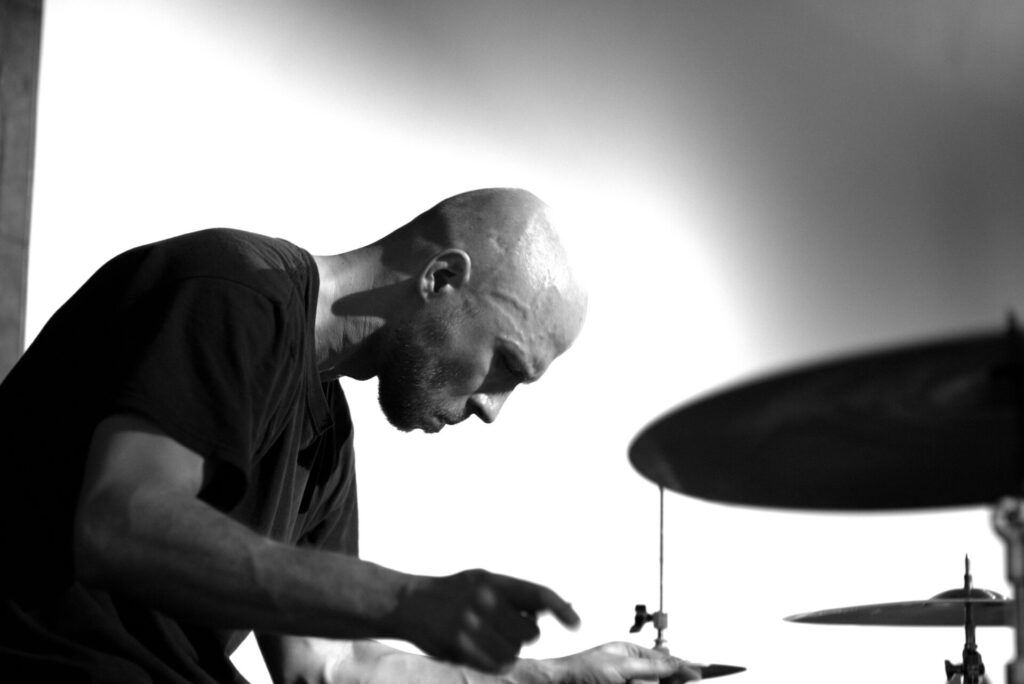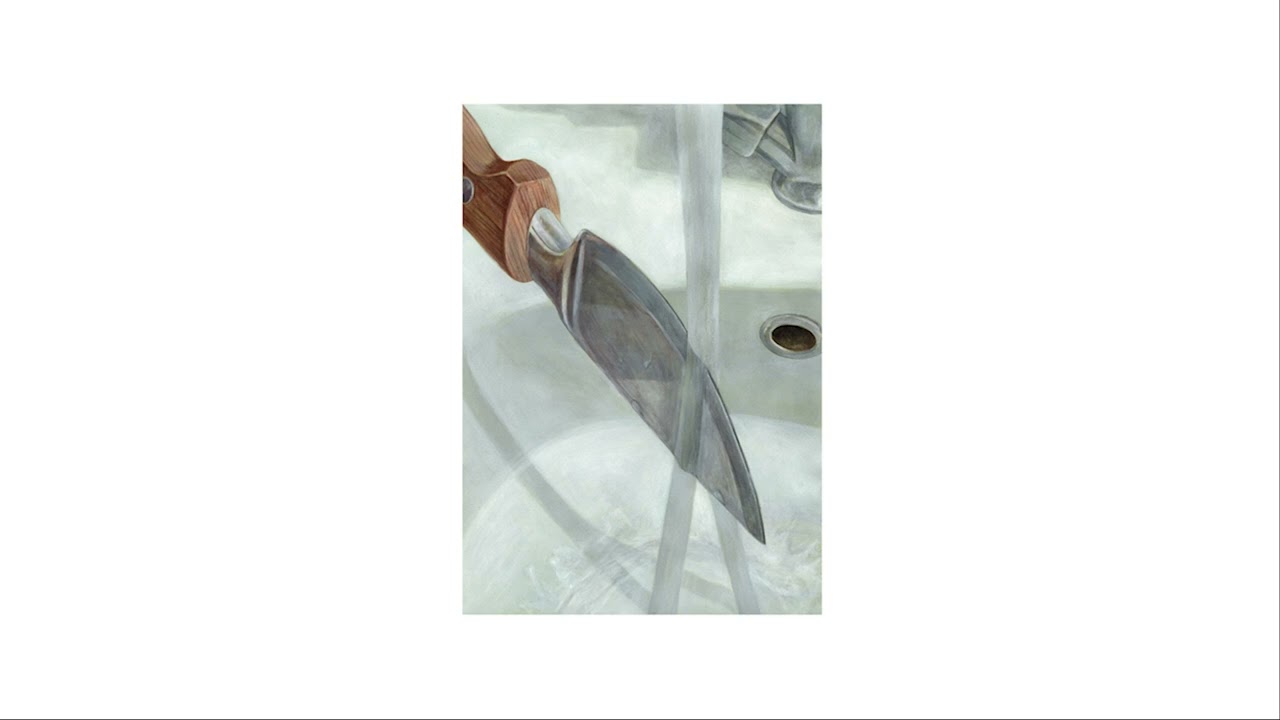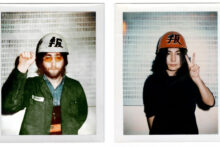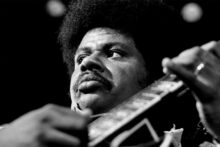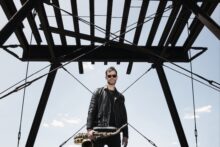Polish percussionist Adam Golebiewski is a prolific collaborator with boundless musical curiosity. With his sculptural approach to the drums, he’s worked with underground musicians including Kevin Drumm, Thurston Moore, Yoko Ono and Mats Gustafsson. His latest release with Japanese electroacoustic duo KAKUHAN stems from an improvised performance at Unsound festival in 2023 – a common trajectory for Golebiewski’s music. “I like to leave a trace when I play with people,” he explains of making recordings after collaborative performances. “Sometimes the best stuff has the shortest life, so I want to make a document of it.”
This particular document, Repercussions (streaming in full below) is an intriguing constellation of sound, assembled from Golebiewski’s atypical percussion, Yuki Nakagawa’s cello, and Koshiro Hino’s electronics. In this trio, each player is a shape-shifter. “It would probably be difficult to name every sound, and who creates it,” says Golebiewski. “Some of Koshiro’s samples sound like my drums and vice versa; some of my techniques sound like Yuki’s cello and vice versa. KAKUHAN both use electronics, which I don’t – but if you ask the average listener, they would probably say my stuff sounds electronic. I like that it’s enigmatic.” Like a cello player, Golebiewski uses friction to create a resonant sound. “A lot of techniques I used sound very similar to bowing, but it’s more working with friction and tension,” he explains. “I create resistance between objects and the drum skin, cymbal, pieces of wood or different metals. These techniques are gestural and have something in common with almost every instrumental practice, as well as the traditional method of firestarting.” The three musicians made the recording the day after their performance at Unsound, quickly capturing their performance chemistry. “Pieces were not composed – they just composed themselves spontaneously.”
Golebiewski’s commitment to investigating every possible sound he can get from his instrument stems from childhood experience. “I have no family tradition of music, but as far as I remember, sound was fascinating to me,” he explains. “I was born on the coast of Poland, surrounded by watery sounds from the harbour and the sea itself, which is basically like a massive instrument. I remember when the cargo train would arrive at the harbour late at night, you would hear the resonance of rails and brakes. It didn’t sound like noise created by a train, it sounded like vocal polyphony. I don’t want to romanticise it too much, but it definitely left a lasting impact on me. I think this and countless other everyday experiences inspire me, as sound phenomena, more than recreating the language of some musical tradition”.
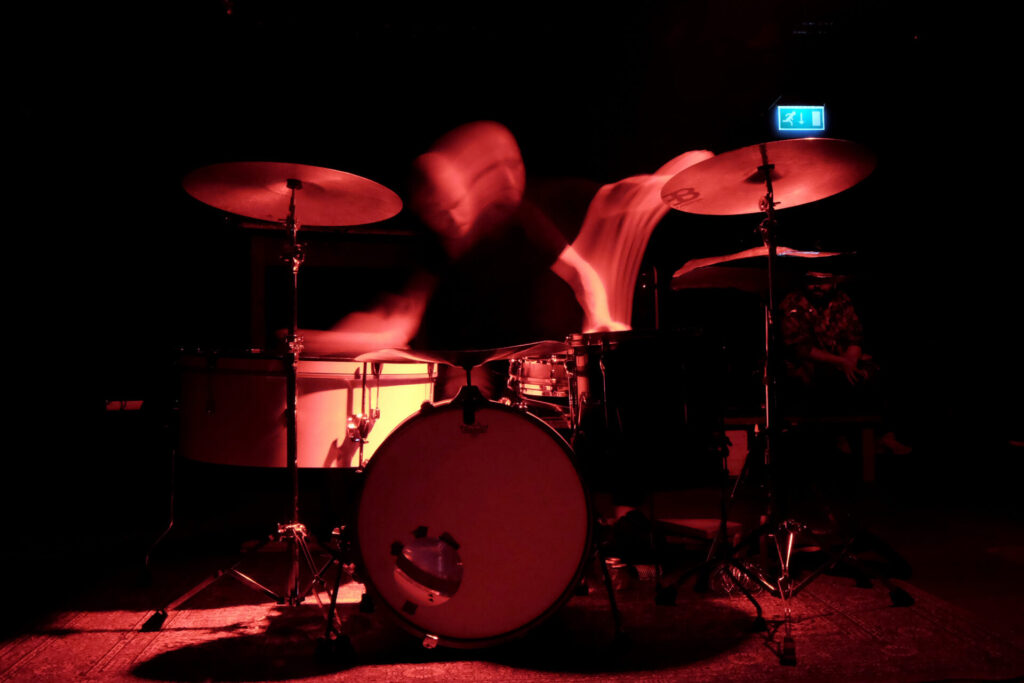
Translating this to the drums, Golebiewski uses them as resonators, working with vibrations and frequencies. “You have almost endless possibilities,” he says of his approach. He describes a technique he’s using for an upcoming solo work that utilises circular breathing to extract a sustained sound from a drum skin. “I use a simple device made with a cone and a pipe, breathing onto the surface of a drum, which is working like a reed. The skin does this microscopic vibration, which then expands. It vibrates differently than a string or wind instrument, because it’s flat and is more unpredictable.” He describes the resulting sound as distinct, profound and ancestral.
This year, Golebiewski returned to Unsound for a performance of River Of Fundament, a hybrid opera-film based on a Norman Mailer novel by artist-filmmaker Matthew Barney and experimental composer Jonathan Bepler. Typically of Barney’s work, the film is a document of complex, large-scale performances in grandiose locations including steel mills and waterways, with participants including Maggie Gyllenhaal, Debbie Harry and Milford Graves. For Unsound, Golebiewski worked with Bepler to perform sections of the score live, in tandem with the sound from the film itself.
“We created an additional sphere on top of the existing sound layer, which also includes music, and we worked quite a lot in the studio prior to the screening,” Golebiewski says of his experience working with Bepler. “It was very tightly composed. Normally I don’t play other people’s music. I don’t want to violate somebody’s work by stepping over it with my character. But River Of Fundament fascinates me. It was very much a compromise, in a positive sense. We kept our independency, but also understood the piece’s rules and dynamic.”
The performance was a major undertaking, in many way. “The film is pretty harsh, both symbolically and explicitly,” Golebiewski explains. “In the final screening, I think we achieved quite accurate sonic content and timing for the images. The duration is almost six hours, so it was demanding to play composed music for that long, but I’m serious about music. Maybe it was a physiological response, but at some point I knew I could maintain playing for several hours more.”
Next, Golebiewski is heading to New York for the US edition of Unsound, where he’s set to play with Evicshen, a San Francisco-based sound artist who performs with self-made electronic instruments. For 2026, he has duo releases planned with Berlin-via Beirut artist Mazen Kerbaj (“a very distinctive trumpeter, we recorded a radically abstract yet coherent album”) and German pianist Reinhold Friedl (“this release is sort of chamber drone music – acoustic but powerful with rich textured sound; Reinhold is an incredible pianist”). Golebiewski’s enthusiasm for his collaborators is palpable when he talks about working on releases with Fred Lonberg-Holm (“the heavyweight of cello”), Sharif Sehnaoui (“my Beirut brother in sound”) Dave Brown (Dave has been a key figure of the Melbourne experimental scene for decades”) and Kevin Drumm (“big boss of electronic music”).
Also coming next year is a trio album with long-time collaborators Thurston Moore and double bass player John Edwards. “It was recorded at Cafe Oto in London, pretty tense and heavy music,” he says of the release. “Sometimes it even touches noise music, but we can be gentle too. Every time I listen to it I find something new, some detail I didn’t hear previously.” Golebiewski has worked with Moore a number of times, including on the 2017 duo album DISARM. Their collaboration began in 2013. “I was asked to join a trio with Thurston Moore and Yoko Ono,” he says of his invitation to play with the underground icons at Poland’s Transatlantyk Festival. Golebiewski says it was a profound experience, but he is resolutely not one to put any collaborators on a pedestal above any others. “I don’t consider it more important than any past or current project I’m working on, even if it’s an unknown person. If the sound language is singular, I’m into it, whatever your name is.”
Golebiewski’s generous, unpretentious attitude is endearing, and crucial to his continued exploration of the drums. “I don’t give a shit about any virtuoso kind of thing, but I do give a shit that sound must be full, bold, very strong and very rich,” he says. “Certainly I do strike the drums more traditionally, but there is so much more than that to discover. And frankly, I don’t even think I’m halfway there.”
Repercussions by KAKUHAN and Adam Golebiewski is released by Unsound and Instant Classic on 24 October. Adam Golebiewski plays Unsound New York, 27 October–6 November. For more information, visit the festival website.

